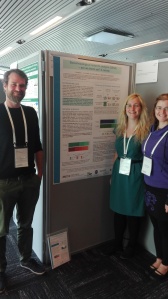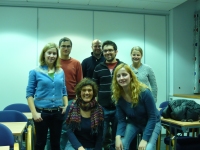The Atmospheric and Oceanic Sciences Program at Princeton University in cooperation with NOAA’s Geophysical Fluid Dynamics Laboratory (GFDL) seeks several postdoctoral research associates and/or more senior scientists to develop and apply Earth System Models (ESMs) and other tools necessary for understanding where, when, and how marine ecosystems may reach critical “tipping points” or abrupt major changes in structure, function, and services. Topics of particular emphasis include: application of GFDL’s current Earth System Models to assess potential marine ecosystem tipping points under climate change, ocean acidification and other human influence, development of benthic and estuarine biogeochemistry and ecosystem components GFDL’s next generation Earth System Model, exploration of coastal representation, and ecological data assimilation. Personnel will join an active group at Princeton and GFDL studying the connections between biogeochemistry, ecosystems and climate (http://gfdl.noaa.gov/climate-and-ecosystems).
NOTE: These positions are still open! Do not let the deadlines deter you.
These are two-year positions (subject to renewal after the first year) based at GFDL in Princeton, New Jersey. Complete applications, including a CV, publication list, 3 references in order to solicit letters of recommendation, and a one-to-two page statement of research interests should be submitted by May 31, 2014 for full consideration, though evaluation will be ongoing. This position is subject to the University’s background check policy.
The Atmospheric and Oceanic Sciences Program at Princeton University in cooperation with NOAA’s Geophysical Fluid Dynamics Laboratory (GFDL), Northeast Fisheries Science Center (NEFSC), and the National Ocean Service (NOS) National Centers for Coastal Ocean Science (NCCOS) seeks a postdoctoral research associate or more senior scientist to develop projections of coastal and/or marine habitats and the response of living marine resources (i.e. fish, deep-sea corals, submerged aquatic vegetation, sea turtles, seabirds, mammals) using downscaled global climate models for the U.S. Northeast Shelf Large Marine Ecosystem (U.S. NES LME). The goal is to develop and improve forecasts of coastal and marine habitats, coupled with the response of living marine resources as a function of climate change. We are interested in assessing the sensitivity of living marine resource projections to the downscaling method used, and in propagating uncertainty in model projections. This could involve a sensitivity analysis of living marine resource projections based on the use of statistical versus dynamical downscaling methods as well as the use of prototype, high-resolution global climate models. Towards this end, the researcher will adapt and develop existing ecological/habitat models for one or more living marine resources in the U.S. NES LME, integrate them with downscaled models, analyze the results, and produce case studies that inform the potential use of marine ecological forecasting for coastal ecosystem management in the NE region.
Candidates with quantitative, interdisciplinary knowledge from subsets of fields including marine ecology/fisheries ecology, oceanography, and climate science are encouraged to apply. Experience conducting uncertainty assessments, spatio-temporal analyses of large data sets and/or model output, and habitat model development experience, are highly desirable.
This is a one-year position (subject to renewal after the first year depending on performance and funding) based at NOAA GFDL in Princeton, New Jersey. Applicants must apply online and submit a CV, publication list, names and contact information for at least three references in order to solicit letters of recommendation, and a one-to-two page statement of research interests by September 30, 2014 for full consideration, though evaluation will be ongoing. Position is subject to the University’s background check policy.
Nippon Foundation Fellow Postdoctoral Position in Climate Modeling and Fisheries at Princeton University
The Atmospheric and Oceanic Sciences Biogeochemistry group at Princeton University is seeking applicants for a postdoctoral position in the area of modeling climate impacts on global fisheries. The position is part of a long-term multi-institutional effort, the Nereus Program, established in collaboration with the Nippon Foundation and University of British Columbia to improve multi-decadal scale predictions of global ocean fisheries.
The individual will join a vigorous interdisciplinary research group under the joint direction of Prof. Jorge Sarmiento of Princeton University and Dr. Charlie Stock of NOAA’s Geophysical Fluid Dynamics Laboratory. He/she will also be able to take advantage of a wide range of related research at Princeton University and at Nereus partner institutions: The University of British Columbia, Duke University, University of Cambridge, Stockholm University and the University of Utrecht. Areas of particular interest for this position include: improving biogeochemical climate-change projections, expanding these projections to improve their utility for fisheries and living marine resource impact assessments, and developing more mechanistic and integrated representations of climate-fisheries interactions.
Applicants must apply online and submit vitae, a statement of research experience and interests, and names of at least 3 references. Review of applications will begin as soon as they are received, and continue until the position is filled. This is a one-year term appointment with possibility of renewal. This position is subject to the University’s background check policy.





